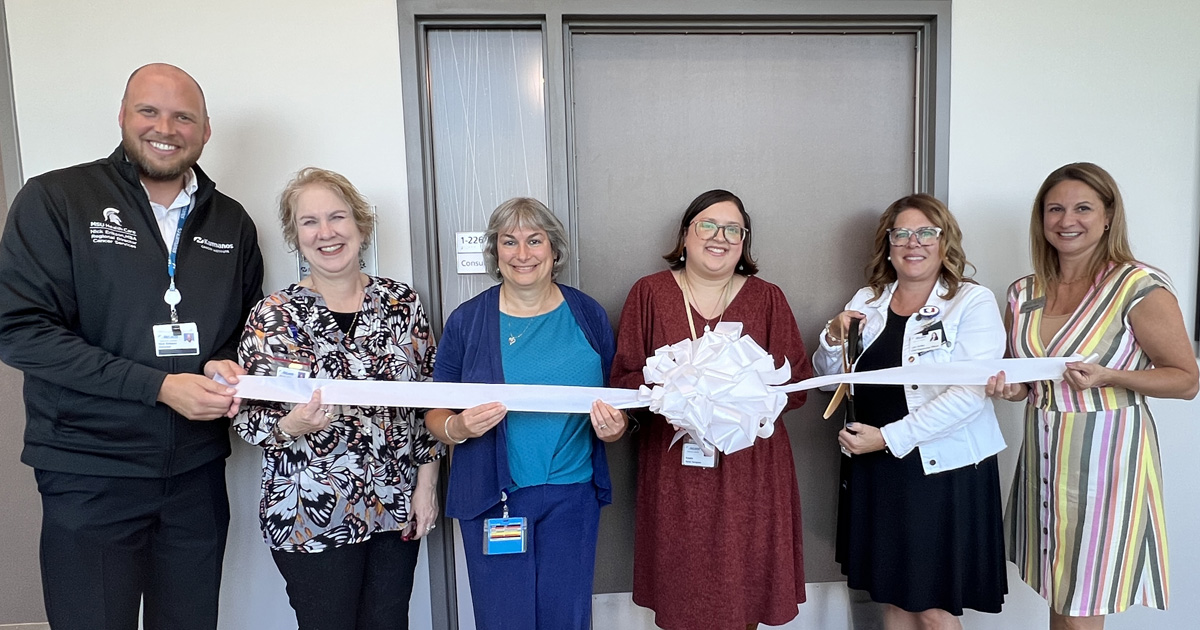
In mid-Michigan, approximately 82,000 people ― one in every eight individuals ― are food insecure, including 15,520 children, according to Greater Lansing Food Bank. Right here in Ingham County, 35,360 people are food insecure, including 7,150 children.
“Patients with cancer face a variety of challenges. Perhaps one of the most important challenges is maintaining a nutritional diet during cancer therapy,” said Daniel Isaac, DO, medical oncologist at Karmanos Cancer Institute (KCI). “Proper nutrition is vital in helping patients tolerate treatment, maintain energy, and achieve the best possible outcomes.”
The Karmanos Cancer Institute at McLaren Greater Lansing is working to ensure that its cancer patients get the nutritional support they need. In September, KCI cut the ribbon on a brand-new food pantry specifically for oncology patients receiving care at the cancer center.
“Two of our social workers shared the nutritional struggles they were seeing in some of our patients,” said Nick Erikson, director of oncology services at Karmanos Cancer Institute at McLaren Greater Lansing. “We got together with our foundation and Greater Lansing Food Bank and brainstormed how we could best go about offering this type of support to our patients. The project evolved from the idea of a truck that could visit the hospital occasionally to a full pantry, accessible daily.”
The McLaren Greater Lansing Foundation funded the start-up costs for building the pantry, including purchasing the shelving needed and supplying the food. Greater Lansing Food Bank has partnered to prepare the boxes and provide training and support.
“Any food-insecure oncology patient can tell any member of the staff, or fill out the distress questionnaire and answer that they are food insecure, and they will receive help,” said Kaytee Ivison, oncology nurse navigator at KCI. “If a person is a member of SNAP or WIC, or receives free or reduced-price lunches, they would certainly qualify, but there is some flexibility. If you have a need, we will be here for you.”
Ivison, along with KCI social workers Michele Loree and Heather Spotts, completed a training program at Greater Lansing Food Bank to run the food pantry. This training program included classes on food safety, nondiscrimination, and the criteria for running a food pantry.
“It’s worth the work we have put in, even if it helps just one individual who didn’t have access before or didn’t know where they were going to get their food because they are faced with this medical calamity that has upended their universe and affected them financially, emotionally, and physically,” said Michelle Lantz, CEO of Greater Lansing Food Bank. “For McLaren to be able to serve its patients in this way is so meaningful to the community. Having McLaren as a partner to help us distribute food to those who need it helps us with our mission of ending food insecurity in the greater Lansing area.”
The opening of the food pantry is just one way McLaren is working towards improving the patient experience and ensuring that their patients receive care at every level.
“I had experience opening food pantries in hospitals on the east side of the state, but nothing specific for oncology patients,” said Kelly DelReal, director of community resources and partnerships at Greater Lansing Food Bank. “I think there is still more we can do, and I look forward to working with the team at McLaren to continue to grow this program.”
For more information about oncology services at Karmanos Cancer Institute at McLaren Greater Lansing, click here. For more information about the McLaren Greater Lansing Foundation, click here.
For more articles on health and wellness, click here.